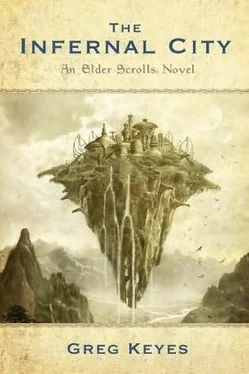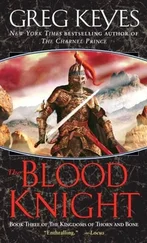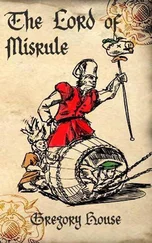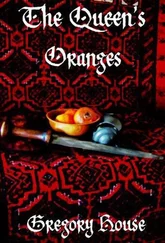Gregory Keyes - The Infernal city
Здесь есть возможность читать онлайн «Gregory Keyes - The Infernal city» весь текст электронной книги совершенно бесплатно (целиком полную версию без сокращений). В некоторых случаях можно слушать аудио, скачать через торрент в формате fb2 и присутствует краткое содержание. Жанр: Фэнтези, на английском языке. Описание произведения, (предисловие) а так же отзывы посетителей доступны на портале библиотеки ЛибКат.
- Название:The Infernal city
- Автор:
- Жанр:
- Год:неизвестен
- ISBN:нет данных
- Рейтинг книги:5 / 5. Голосов: 1
-
Избранное:Добавить в избранное
- Отзывы:
-
Ваша оценка:
- 100
- 1
- 2
- 3
- 4
- 5
The Infernal city: краткое содержание, описание и аннотация
Предлагаем к чтению аннотацию, описание, краткое содержание или предисловие (зависит от того, что написал сам автор книги «The Infernal city»). Если вы не нашли необходимую информацию о книге — напишите в комментариях, мы постараемся отыскать её.
The Infernal city — читать онлайн бесплатно полную книгу (весь текст) целиком
Ниже представлен текст книги, разбитый по страницам. Система сохранения места последней прочитанной страницы, позволяет с удобством читать онлайн бесплатно книгу «The Infernal city», без необходимости каждый раз заново искать на чём Вы остановились. Поставьте закладку, и сможете в любой момент перейти на страницу, на которой закончили чтение.
Интервал:
Закладка:
“So you think we should leave before he gets back.”
“I think we should go looking for food. In the kitchens. See what we’re up against. We can always come back here if the trash-tender still seems like a good bet.”
“How will we know that until we meet the rest of them?”
“Of whom?”
“Whoever he went to get. The underground. The resistance.”
“You and your books,” Glim muttered. “Resistance.”
“Look around you, Glim. When people are forced to live in places like this, there’s usually a resistance.”
“Lots of people lived like this in Lilmoth,” Glim replied. “They didn’t resist anything.”
“Well, maybe they should have,” she retorted. “Maybe then the An-Xileel couldn’t have—”
“It was the tree, Nn, not the An-Xileel. The Hist decide.”
“The city tree is psychotic.”
“Maybe.”
“You said it’s happened before, one Hist breaking with the others.”
“You’re changing the subject.”
“Fine. We might as well have some options. Do you know how to get to these kitchens?”
“Of course not. But we know where they are.” He pointed up.
“Fair enough,” she conceded. Her hand still on his shoulder, she pushed up to standing. Then she noticed some figures approaching along the path that had brought them there. “Oops. Too late. Wemreddle’s back.”
“That’s not much of a resistance,” Glim noted. “Six besides him.”
“At least they’re armed.”
Like Wemreddle, they all appeared to be human or mer. They wore uniforms—yellow shirts, aprons, black pants—and they carried an assortment of large knives and cleavers. The only one who was dressed differently was a fellow with thick, curly red hair and beard. His shirt was a black-and-yellow tartan pattern.
Wemreddle was trailing the lot. The red-beard spoke.
“It’s true, you’re really from the world beyond?”
“Yes,” Annaïg said.
“And you have knowledge of its plants, animals, herbs, minerals, essences, and so on?”
“Some,” she replied. “I have studied the art of alchemy—”
“Come with us, then.”
“To where?”
“To my kitchen. Fexxel’s kitchen.”
“Wemreddle,” Annaïg exploded. “You piece of—”
“They’ll let me come up,” the man simpered. “They’ll let me work up there. This is for the best. You’ll be protected. You need that.”
“Protection from whom?”
“Me, for one,” another voice shouted.
A second group was approaching, twice as large as Fexxel’s, and just as heavily armed.
Fexxel spun. “You worm,” he roared at Wemreddle. “I bargained in good faith with you!”
“I didn’t tell her! I swear it!”
Annaïg could make out the newcomer now. She wore a checked indigo-and-lapis shirt, apron, and indigo pants. Her face was angular, drawn, hard, and her teeth gleamed like opals in the dim light.
“He didn’t, actually,” the woman said. “One of your own betrayed you. More’s the pity for the poor worm, because I don’t owe him anything.”
Wemreddle began a sort of soft wailing.
“I’ll have them, Fexxel.”
“I have right, Qijne. I have claim.”
“The Midden is neutral territory.”
“I found them first.”
“Well, you can take it up with someone next time you come out of the sump,” she replied. “Or you can walk back to your kitchen in the meat you’re wearing.”
Annaïg could see Fexxel was trembling, whether with fear or fury, it was hard to say.
“It might be worth it,” he said. “You outnumber us, but I’ll kill you before I go down.”
“Ah, determination,” Qijne said, stepping forward, away from her companions. “Passion. Do you really have such passions, Fexxel? Or is this all superficial, like your cooking?”
Her arm whipped out and a bright, bloody line appeared on Fexxel’s cheek. His eyes widened and his mouth worked, but for the moment no sound came out.
Annaïg was still trying to understand what had happened. Qijne’s hand had been about a foot from Fexxel’s face, and she hadn’t seen a weapon in it. Nor did she now.
Fexxel found his voice. “You crazy bitch!” he screeched, blood pouring through the fingers he had pressed to his face.
“See?” Qijne said. “Just blood under there, nothing else. Go home, Fexxel, or I’ll make a pie of you.”
Fexxel heaved several great breaths, but he didn’t say anything else. Instead he left, as instructed, and his followers went with him, glancing back often.
Qijne turned her gaze on Annaïg. Her eyes were as black as holes in the night.
“And you, my dear, are the cook?”
“I—I can cook.”
“And what is this?” she asked, stabbing a finger toward Glim.
“Mere-Glim. He’s an Argonian. He doesn’t speak Mer.”
Qijne cocked her head. “Mer,” she said experimentally, then seemed to dismiss the word—and Glim—with a shake of her head. “Well,” she said. “Come, then. We’ll go to my kitchen.”
Annaïg lifted her chin. “Why should I?” she asked.
Qijne blinked again, then leaned in close and spoke in a casual, confidential manner. “I don’t need all of you, you know. Your legs, for instance—not very useful to me. More of a problem, really, if I imagined you were prone to running off.”
Each word was like an icicle driven in her back. There was no doubt that the woman was serious.
Qijne patted her on the shoulder. “Come along,” she said.
And she came, telling herself that this was what she needed to be doing, trying to learn something about the enemy, trying to find out how to stop this unholy thing.
But it was hard to keep that in her head, because she had never in her life been more afraid of anyone than she was of Qijne.
EIGHT

“This isn’t a kitchen,” Annaïg whispered to Glim. “This is …”
But she had no word for it.
Her first impression was of a forge, or furnace, because enormous rectangular pits of almost white-hot stone lined up down the center of a vast chamber carved and polished from the living rock. Above the pits innumerable metal grates, boxes, cages, and baskets depended from chains, and vast sooty hoods sucked most of the heat and fumes up higher still into Umbriel. Left and right, red maws gaped from the walls—ovens, obviously, but really more like furnaces. Between them, beings strange and familiar crowded and hurried about long counters and cabinets, wielding knives, cleavers, pots, pans, saws, awls, and hundreds of unidentifiable implements.
Though the smells here were generally cleaner than those of the Midden, they were just as varied, and decidedly more alien.
So was the staff; many of them resembled the peoples she knew—there were in particular many who looked like mer; there were others for which—like the place itself—she had no name. She saw thick figures with brick-red skin, fierce faces, and small horns on their heads, working next to ghostly pale blue-haired beings, spherical mouselike creatures with stripes, and a veritable horde of monkeylike creatures with goblinesque faces. These last scrambled along the shelves and cabinets, tossing bottles and tins from shelves in the stone that rose sixty feet along the walls, although in most of the room the ceiling crushed down almost to the level of the tallest head.
But Qijne led her through all of this, past searing chunks of meat, huge snakelike creatures battering against the bars of their cages as the heat killed them, cauldrons that smelled of leek and licorice, boiling blood, molasses.
After a hundred paces the cooking pits were replaced by tables crowded with more delicate equipment of glass and bright metal. Some were clearly made for distillation, this made obvious by the coils that rose above; others resembled retorts, parsers, and fermentation vats. Along the walls were what amounted to vaster versions of these things, distilling, parsing, and fermenting tons of material.
Читать дальшеИнтервал:
Закладка:
Похожие книги на «The Infernal city»
Представляем Вашему вниманию похожие книги на «The Infernal city» списком для выбора. Мы отобрали схожую по названию и смыслу литературу в надежде предоставить читателям больше вариантов отыскать новые, интересные, ещё непрочитанные произведения.
Обсуждение, отзывы о книге «The Infernal city» и просто собственные мнения читателей. Оставьте ваши комментарии, напишите, что Вы думаете о произведении, его смысле или главных героях. Укажите что конкретно понравилось, а что нет, и почему Вы так считаете.












